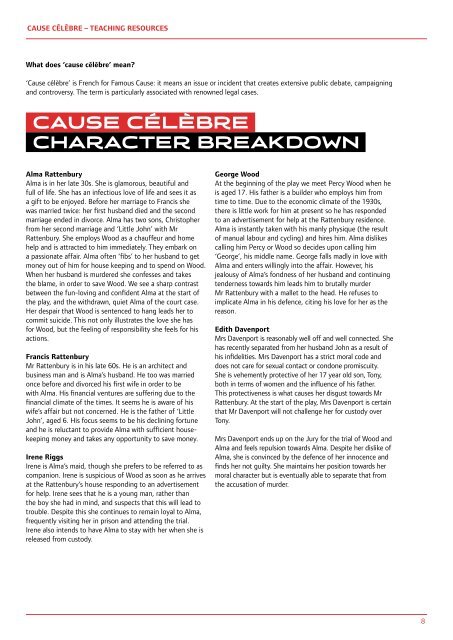Cause Celebre - IdeasTap
Cause Celebre - IdeasTap
Cause Celebre - IdeasTap
Create successful ePaper yourself
Turn your PDF publications into a flip-book with our unique Google optimized e-Paper software.
CAUSE CélèBRE – TEACHINg RESOURCES<br />
What does ‘cause célèbre’ mean?<br />
‘<strong>Cause</strong> célèbre’ is French for Famous <strong>Cause</strong>: it means an issue or incident that creates extensive public debate, campaigning<br />
and controversy. The term is particularly associated with renowned legal cases.<br />
<strong>Cause</strong> Célèbre<br />
Character Breakdown<br />
Alma Rattenbury<br />
Alma is in her late 30s. She is glamorous, beautiful and<br />
full of life. She has an infectious love of life and sees it as<br />
a gift to be enjoyed. Before her marriage to Francis she<br />
was married twice: her first husband died and the second<br />
marriage ended in divorce. Alma has two sons, Christopher<br />
from her second marriage and ‘Little John’ with Mr<br />
Rattenbury. She employs Wood as a chauffeur and home<br />
help and is attracted to him immediately. They embark on<br />
a passionate affair. Alma often ‘fibs’ to her husband to get<br />
money out of him for house keeping and to spend on Wood.<br />
When her husband is murdered she confesses and takes<br />
the blame, in order to save Wood. We see a sharp contrast<br />
between the fun-loving and confident Alma at the start of<br />
the play, and the withdrawn, quiet Alma of the court case.<br />
Her despair that Wood is sentenced to hang leads her to<br />
commit suicide. This not only illustrates the love she has<br />
for Wood, but the feeling of responsibility she feels for his<br />
actions.<br />
Francis Rattenbury<br />
Mr Rattenbury is in his late 60s. He is an architect and<br />
business man and is Alma’s husband. He too was married<br />
once before and divorced his first wife in order to be<br />
with Alma. His financial ventures are suffering due to the<br />
financial climate of the times. It seems he is aware of his<br />
wife’s affair but not concerned. He is the father of ‘Little<br />
John’, aged 6. His focus seems to be his declining fortune<br />
and he is reluctant to provide Alma with sufficient housekeeping<br />
money and takes any opportunity to save money.<br />
Irene Riggs<br />
Irene is Alma’s maid, though she prefers to be referred to as<br />
companion. Irene is suspicious of Wood as soon as he arrives<br />
at the Rattenbury’s house responding to an advertisement<br />
for help. Irene sees that he is a young man, rather than<br />
the boy she had in mind, and suspects that this will lead to<br />
trouble. Despite this she continues to remain loyal to Alma,<br />
frequently visiting her in prison and attending the trial.<br />
Irene also intends to have Alma to stay with her when she is<br />
released from custody.<br />
george Wood<br />
At the beginning of the play we meet Percy Wood when he<br />
is aged 17. His father is a builder who employs him from<br />
time to time. Due to the economic climate of the 1930s,<br />
there is little work for him at present so he has responded<br />
to an advertisement for help at the Rattenbury residence.<br />
Alma is instantly taken with his manly physique (the result<br />
of manual labour and cycling) and hires him. Alma dislikes<br />
calling him Percy or Wood so decides upon calling him<br />
‘George’, his middle name. George falls madly in love with<br />
Alma and enters willingly into the affair. However, his<br />
jealousy of Alma’s fondness of her husband and continuing<br />
tenderness towards him leads him to brutally murder<br />
Mr Rattenbury with a mallet to the head. He refuses to<br />
implicate Alma in his defence, citing his love for her as the<br />
reason.<br />
Edith Davenport<br />
Mrs Davenport is reasonably well off and well connected. She<br />
has recently separated from her husband John as a result of<br />
his infidelities. Mrs Davenport has a strict moral code and<br />
does not care for sexual contact or condone promiscuity.<br />
She is vehemently protective of her 17 year old son, Tony,<br />
both in terms of women and the influence of his father.<br />
This protectiveness is what causes her disgust towards Mr<br />
Rattenbury. At the start of the play, Mrs Davenport is certain<br />
that Mr Davenport will not challenge her for custody over<br />
Tony.<br />
Mrs Davenport ends up on the Jury for the trial of Wood and<br />
Alma and feels repulsion towards Alma. Despite her dislike of<br />
Alma, she is convinced by the defence of her innocence and<br />
finds her not guilty. She maintains her position towards her<br />
moral character but is eventually able to separate that from<br />
the accusation of murder.<br />
8









